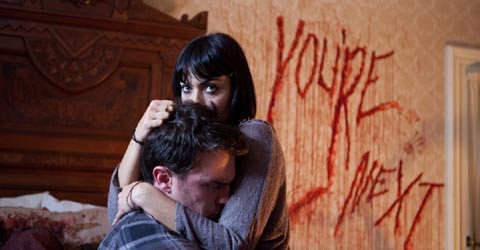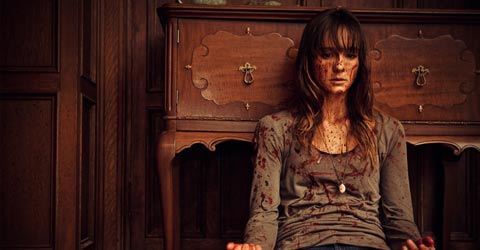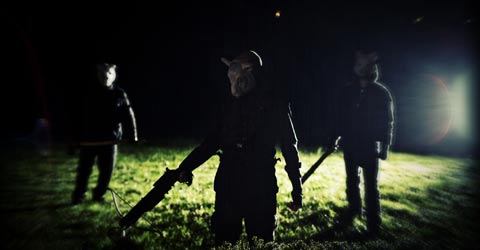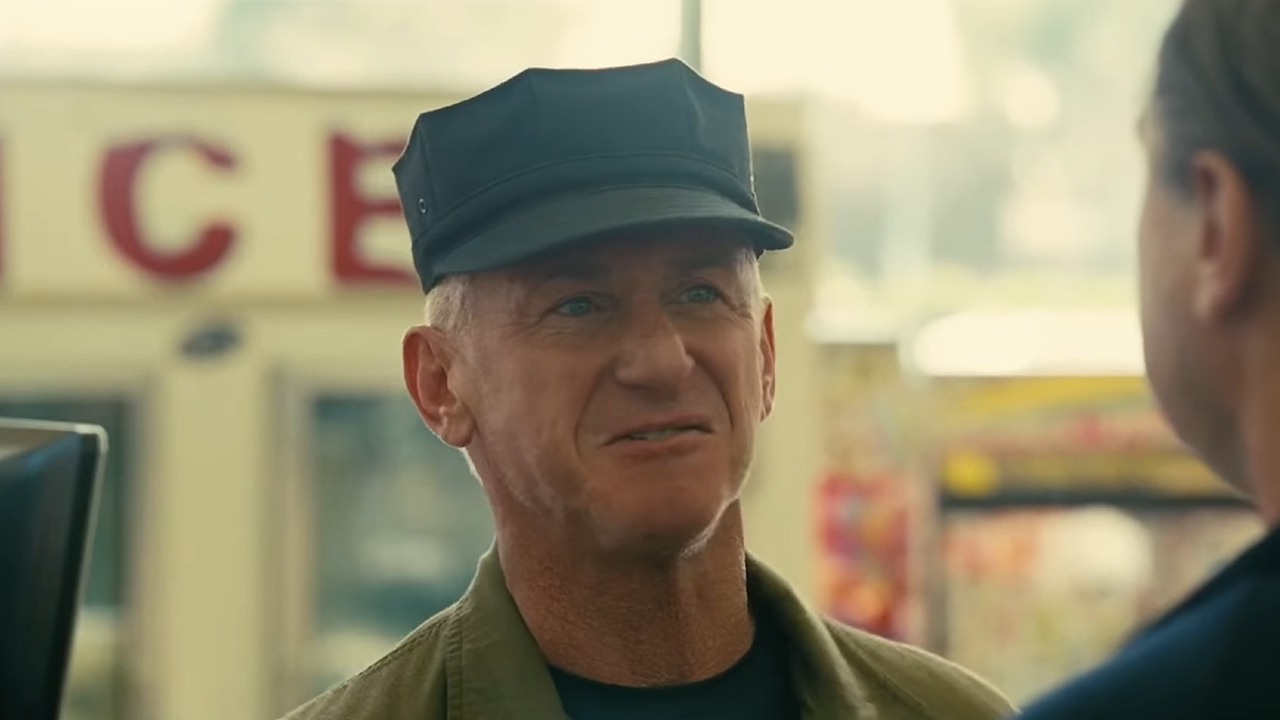How Adam Wingard's You're Next Has Been Improved On Its Long Journey To Theaters

As I noted in my review from the SXSW , we’ve been waiting a long time for Adam Wingard’s You’re Next. The film had its world premiere at the Toronto International Film Festival in 2011, where it received rave reviews, and followed that up with a screening at Fantastic Fest that same year, but since then has been completed off the map.
After a full year of waiting Lionsgate finally gave the movie a release date and will have it in theaters this August, but what has been going on with the film since its debut? According to the director, it’s only been improved.
The day after the SXSW screening on Sunday night at midnight I had the chance to sit down with Wingard to talk not only refining the film, but also his collaboration with screenwriter Simon Barrett and how the fact that star Sharni Vinson comes from Australia actually makes her character more believable.
Are you enjoying the festival?
Oh yeah. It’s been a lot of fun.
This is kind of a home for you, I have to imagine, yeah?
Yeah, well, I mean, I just love playing movies here, you know? They always go over well. It’s the right crowd for it.
Your Daily Blend of Entertainment News
So, how did you feel about the screening last night?
Oh, I loved it. See, I missed it when it played at Fantastic Fest during the initial run. Our two screening run, basically. And I was really bummed out because it was received really well and this is such a movie that is designed to be made for audience participation. So, there’s nothing better than watching the film with a huge crowd like we did last night.
Exactly.
And just having people go nuts for it.
So, that’s something that’s kind of entering your mind, when even just in production on it too?
Oh yeah, I mean, like this movie, most of the stuff I’ve done prior to this were all very low budget things, so a lot of the decisions made were made from that perspective. The goal in those films is just how do we just make this movie. So, a lot of stylistic choices and so forth were designed just to be able to get through the project, you know? And find a way to make that work and so it’s kind of almost more of a compromise right away. But, with this film it was always about, to me, doing a film that is made for an audience, with an audience in mind and also an audience that isn’t necessarily used to watching experimental films. I wanted to do something where your casual movie goer could watch it and pick it up. So, going into it, my DP and I, we watched a lot of Hollywood movies and horror films, like Alien, that we thought were the most effective and tried to figure out what made them work. What makes a movie feel expensive? What makes a movie feel, you know, like the movie that’s played in a theater? And that’s kind of what our focus was going into it.
Absolutely.
And what that really means is that you’re using, you know, more of a conventional cinematic language. You can’t rely on experimental gimmicks to get you out of the scene and so forth. But, at the same time, it’s like trying to find a way to put your own stylization on top of that so it’s not like just boring or whatever, but it does create a set of rules you have to abide by and it just makes the process that much more difficult, because your coverage is more intensive and so forth, but, it’s so much more worth it when you can sit there with a crowd and have people cheering and laughing and screaming, you know, that whole thing.

I remember when the film played at Toronto – I wasn’t there but I remember going on Twitter and seeing all of these incredible reactions and I’ve been waiting to see this film ever since. I was super excited. So I have to imagine you’re even more so to finally have it be released.
Oh yeah. Well, we ended up getting bought, basically a month before Lionsgate merged with Summit and so a lot of movies were getting dropped to video because the just had such a huge slate and so we were really nervous that was going to happen to us and Lionsgate told us all along, you know, Jason Constantine, he’s basically like, “We love this movie. We believe in it and as soon as we have an opening for it, we’re going to put it out,” and, at first you’re like, “Oh, I hope he’s not bullshitting us,” but he put his money where his mouth was, you know, and they really did get behind it and pushed it forward.
Has the film changed at all or is it still the same as it was at Toronto and Fantastic Fest?
The main thing that changed since Toronto is, the movie was actually done with a base of four month turnaround. It was super rushed and the main thing we thought was rushed was the sound mix. Yeah, the sound mix was fine before, but we’d always been kind of unhappy with the Foley and just sound of the sound design elements and there are two music tracks we wanted to add different places in there. So, since we had some time, and Lionsgate was willing to let us get it to the next stage for another ten days, we went in there and we just tweaked things, we made ADR sound better, we did a couple lines, we redid them, because the performances didn’t match on the screen or the audio quality was different. So, basically, we just used this opportunity, which was great, while we were waiting to make the movie what we wanted.
Totally. To kind of go back to the beginning, I know you’ve worked with Simon before on other projects, but I’m curious, when it came to collaborating on this one, were you there for the entire script-writing process or did you...?
No, no, no. That’s not how Simon and I work. Basically, I come to Simon with my interests and in this case, I said, “Simon, let’s do a home invasion movie,” specifically the movies I told him that I was really interested in was Them, The Strangers and the first ten minutes of Scream, you know. And I was like, “Can we make a movie like that?” Simon literally just took that and went off and did his own thing and I was expecting to have a movie about one person in a house, because I really wanted to do something that was more, cause coming out of A Horrible Way to Die, which is like this drama, mumble core thing, with a lot of talking and stuff. I wanted to do a movie that was more technical based and it was really funny, because then I got the script and it was even more complicated then I was expecting, in all ways...totally it’s like, it’s a very challenging movie and I thought, “Dammit. I thought this was going to be something easy.”
But yeah, the way Simon and I work is I’ll tell him my interests and if it clicks with him, he goes off and just writes it and then the way we know that it’s the right film to do is if whenever he delivers that script, if it’s about 90% there, usually it’s like, “Ok, this is the one to do,” because we’ve gone done the line with other projects, specifically, recently we went down the line with this action thing and it just never came together and you just can’t force it. Simon’s the kind of guy who’s like, he does his thing and I do my thing and we give each other notes and stuff, but we respect each other as individual artists and stuff and I want him to put his voice on it, because it inspires me and then he lets me do my things as a director and gives me space sometimes to improvise lines. He’s not going to care.
He’s not precious about it.
Yeah, exactly. He knows that anything I’m doing, I’m just trying to make the best movie and I know he’s trying to make the best movie and there’s no point in second guessing each other and it always works out.

I do have to ask about Sharni [Vinson], because she’s amazing in this film and I just love the character. One of the things that I really liked is that when you first meet Erin she doesn’t necessarily look like this physically intimidating person. But once things actually get started, you completely believe it. I’m just curious, what was the process of finding Sharni to play that part and making sure that translated?
Finding her was very difficult, because, you know, during the audition process, a lot of girls would show up with cut-off shorts and like, their shirt tied up, showing their midsection and everything and they’re kind of posing and acting tough and it was like, “This is exactly the opposite of what I want,” and Sharni comes in there and she just personifies toughness. She just is tough. She was a dancer so she knows how to do physical things and just her being Australian in itself. I mean, that wasn’t something scripted. She shows up and she just is that and I think subconsciously, we all think people from Australia are more badass anyways.
Well, like 90% of the worst things in the world live over there.
Exactly. The bugs are bigger, more poisonous.
Sharks and everything.
Exactly and the weather and everything else. So, all those things kind of worked together and..., but yeah, in the movie itself, I was really influenced by the way they handled Sigourney Weaver’s character in Alien. She doesn’t feel like the main character in the beginning of the film and that’s what we wanted out of this. We wanted her to earn her role as the main character and Sharni earns it, because if she wasn’t able to hold that movie together, the whole thing rested on her shoulders.
For more of our SXSW 2013 coverage, click HERE.

Eric Eisenberg is the Assistant Managing Editor at CinemaBlend. After graduating Boston University and earning a bachelor’s degree in journalism, he took a part-time job as a staff writer for CinemaBlend, and after six months was offered the opportunity to move to Los Angeles and take on a newly created West Coast Editor position. Over a decade later, he's continuing to advance his interests and expertise. In addition to conducting filmmaker interviews and contributing to the news and feature content of the site, Eric also oversees the Movie Reviews section, writes the the weekend box office report (published Sundays), and is the site's resident Stephen King expert. He has two King-related columns.
